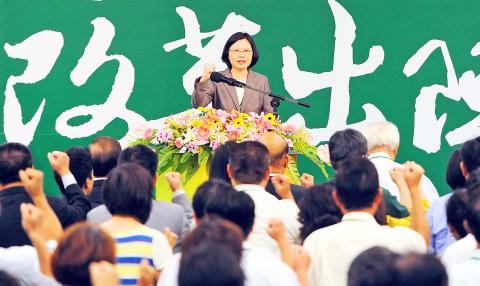Democratic Progressive Party (DPP) Chairperson Tsai Ing-wen (蔡英文) yesterday sent all the proposals in the national party congress regarding the DPP’s China policy, including the widely discussed freezing of its Taiwan independence clause, to the party’s Central Executive Committee without discussion, defusing potential tension surrounding the issue despite drawing criticism from party members.
Citing time constraints, Tsai, who presided over the meeting, proposed to send the initiatives to the committee because there was “not enough time left for a thorough discussion over the much-disputed and important issue regarding changing the party charter.”
Only about 20 minutes were left in the scheduled 60-minute meeting before the party representatives were set to take hours voting for the new members of the committee and the Central Standing Committee, the DPP’s decisionmaking bodies.

Photo: Liao Chen-huei, Taipei Times
Several members briefly protested Tsai’s move and voiced their displeasure, despite the majority of the hundreds of representatives applauding to show their agreement with Tsai’s decision.
“If the Central Executive Committee decides that a wide range of discussion and opinion-gathering is necessary, we don’t rule out organizing an extraordinary party congress,” Tsai added.
Among the dozen items on the meeting’s agenda, the proposals related to the Taiwan independence clause in the party charter and its China policy were the focal point of the congress, as the dispute over the proposal has been going on for months and members with different ideologies challenged each other with their initiatives.
The contentious items included a proposal to freeze the independence clause — which calls for the establishment of a republic of Taiwan — to boost the party’s chance of returning to power; a proposal that called for the next presidential candidate to submit an “independence timetable” and a proposed “resolution on development across the Taiwan Strait” to help the nation join international organizations.
DPP Legislator Chen Ting-fei (陳亭妃) also launched a motion — seen as a retaliation to the “freezing independence clause” proposal — that called for the implementation of the DPP’s 2007 resolution on making Taiwan a normal country. The initiative was also sent to the Central Executive Committee.
In response to reporters’ questions after the meeting, Tsai insisted that her decision was appropriate, saying that the DPP charter had been amended eight times since its founding in 1986 and not once had the charter been amended without comprehensive discussions.
Almost all DPP heavyweights saw freezing the clause as unnecessary, with Greater Tainan Mayor William Lai (賴清德) saying before the meeting that “whether or not [freezing the independence charter] would shorten the DPP’s ‘last mile’ of returning to power should be carefully examined.”
Former party chairman Su Tseng-chang (蘇貞昌) and former premier Yu Shyi-kun opposed the proposal. Yu said it would be “impossible” for the proposal to be passed because Taiwanese independence was one of the DPP’s core values.
The national congress was the first gathering of party representatives across the nation since Tsai assumed the party’s helm in May.
In her opening remarks, Tsai said Taiwanese “have had enough” of President Ma Ying-jeou’s (馬英九) administration, as he has wasted the past six years on political infighting and the pursuit of his presidential legacy by bringing Taiwan closer to China without regard for the consequences.

MAKING WAVES: China’s maritime militia could become a nontraditional threat in war, clogging up shipping lanes to prevent US or Japanese intervention, a report said About 1,900 Chinese ships flying flags of convenience and fishing vessels that participated in China’s military exercises around Taiwan last month and in January last year have been listed for monitoring, Coast Guard Administration (CGA) Deputy Director-General Hsieh Ching-chin (謝慶欽) said yesterday. Following amendments to the Commercial Port Act (商港法) and the Law of Ships (船舶法) last month, the CGA can designate possible berthing areas or deny ports of call for vessels suspected of loitering around areas where undersea cables can be accessed, Oceans Affairs Council Minister Kuan Bi-ling (管碧玲) said. The list of suspected ships, originally 300, had risen to about

DAREDEVIL: Honnold said it had always been a dream of his to climb Taipei 101, while a Netflix producer said the skyscraper was ‘a real icon of this country’ US climber Alex Honnold yesterday took on Taiwan’s tallest building, becoming the first person to scale Taipei 101 without a rope, harness or safety net. Hundreds of spectators gathered at the base of the 101-story skyscraper to watch Honnold, 40, embark on his daredevil feat, which was also broadcast live on Netflix. Dressed in a red T-shirt and yellow custom-made climbing shoes, Honnold swiftly moved up the southeast face of the glass and steel building. At one point, he stepped onto a platform midway up to wave down at fans and onlookers who were taking photos. People watching from inside

Japan’s strategic alliance with the US would collapse if Tokyo were to turn away from a conflict in Taiwan, Japanese Prime Minister Sanae Takaichi said yesterday, but distanced herself from previous comments that suggested a possible military response in such an event. Takaichi expressed her latest views on a nationally broadcast TV program late on Monday, where an opposition party leader criticized her for igniting tensions with China with the earlier remarks. Ties between Japan and China have sunk to the worst level in years after Takaichi said in November that a hypothetical Chinese attack on Taiwan could bring about a Japanese

The WHO ignored early COVID-19 warnings from Taiwan, US Deputy Secretary of Health and Human Services Jim O’Neill said on Friday, as part of justification for Washington withdrawing from the global health body. US Secretary of State Marco Rubio on Thursday said that the US was pulling out of the UN agency, as it failed to fulfill its responsibilities during the COVID-19 pandemic. The WHO “ignored early COVID warnings from Taiwan in 2019 by pretending Taiwan did not exist, O’Neill wrote on X on Friday, Taiwan time. “It ignored rigorous science and promoted lockdowns.” The US will “continue international coordination on infectious